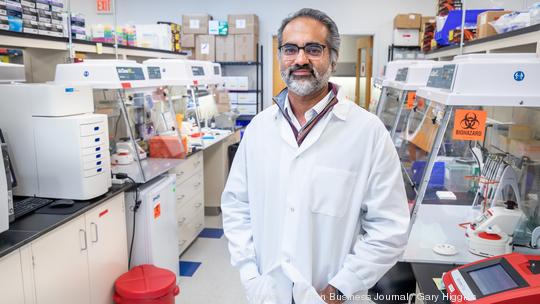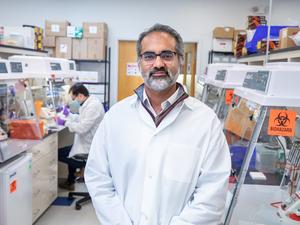
When Sherlock Biosciences was founded in early 2018, the idea behind the company was simple: Despite myriad advances in diagnostics, no major transformations were taking place. Sherlock's founders believed its platform, which uses the gene-editing technology CRISPR, could drive forward a new type of diagnostic test.
In early 2020, the Covid-19 pandemic provided that opportunity. Now, the Sherlock team is on its way to providing a point-of-care, paper-strip test for Covid that could be purchased at a local pharmacy, like a pregnancy test.
Last year, Sherlock shifted its focus entirely on SARS-CoV-2, the virus that causes Covid-19, by creating a diagnostic test using CRISPR technology. The CRISPR enzyme identifies DNA or RNA on the virus, then labels that genetic data and begins cutting it so it generates a signal.
The U.S. Food and Drug Administration approved Sherlock's CRISPR diagnostic for SARS-CoV-2 in May of last year, making it the first-ever use of CRISPR in the fight against the pandemic. At the time of the approval, Sherlock's test could provide results in about an hour.
Now, with the help of a combined $12.5 million in grants from Open Philanthropy and the Bill & Melinda Gates Foundation, Sherlock is working on a new, over-the-counter test that can tell a patient whether they're infected with the coronavirus almost instantly.
"The notion here was, if we could work with these more advanced tools, we could build a company that's more than just a diagnostic company — one that transforms health care by empowering individuals to take control of their own health care," said CEO Rahul Dhanda.
Sherlock's platform, INSPECTR, short for "Internal Splint-Pairing Expression Cassette Translation Reaction," uses synthetic biology for at-home, room-temperature diagnostic tests, either via a paper strip test or an electrochemical readout that can be read with a cellphone. Dhanda envisions a product similar to a pregnancy test that can be bought in a drugstore or administered at so-called "point-of-care" locations like hospitals and doctor's offices.
The enablement of a simple — and cheap — paper-strip test also means that Sherlock's diagnostic would be usable in places without access to health care systems, and it would not require the materials necessary to manufacture and administer PCR tests.
"The supply chain does not rely on the same supply chain of components that has been strained for some of these tests," Dhanda said. "The materials become less of a bottleneck than access to testing centers [does]. This is where our technology can play a very strong role. We can ship and have someone buy, off the shelf at the pharmacy, something that's as simple as a pregnancy test."
Dhanda believes that the pandemic has provided a unique window into the need for rapid, patient-centered diagnostics. Sherlock, he thinks, could be at the forefront of a new wave of diagnostic companies focused on consumer-based, molecular tests.
"What Covid has done is essentially revealed to the rest of the world what the rest of us in diagnostics have always known, which is that we have not really leveraged this sector in health care to have an impact on health," Dhanda said. "The outcry about lack of diagnostics is partially because we have lacked a national strategy, but it's also because ... health care has made it difficult to access diagnostics for anything."








